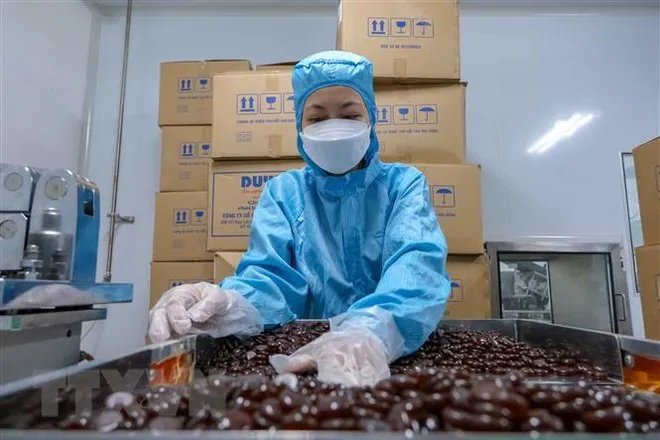Vietnam lacks cutting-edge pharma hubs: experts warn
The average per capita pharmaceutical consumption in Vietnam reached $70 in 2023, a tenfold increase compared to 2000.
Vietnam sorely lacks state-of-the-art pharmaceutical and biotech industrial parks with a comprehensive ecosystem of R&D, clinical testing, and quality assurance facilities.
Le Van Truyen, former Deputy Minister of Health gave his views at a forum on Vietnam's pharmaceutical industry and globalization, held in Hanoi on July 31.
He predicted the pharmaceutical market structure will shift from chemical to biological drugs in the next decade, capturing around 40% share due to aging populations and changing disease patterns.
| A worker at a factory of ADC Pharmaceutical Co., Ltd. in Cantho. Photo: VNA |
"We need strong investment policies to upgrade existing pharmaceutical plants and support companies in building new, state-of-the-art manufacturing facilities," Truyen emphasized.
He cited statistics from the Drug Administration of Vietnam under the Ministry of Health showed that the average per capita pharmaceutical consumption reached $70 in 2023, a tenfold increase compared to 2000.
However, Truyen added that despite the impressive growth, the Vietnamese pharmaceutical industry is facing various challenges. Only 17 out of 250 domestic drug manufacturing facilities have achieved advanced GMP (Good Manufacturing Practice) standards, as required by the EU, Japan, and other countries.
The industry also faces difficulties in technology transfer for the production of new medica-tions, he underlined.
The Drug Administration under the Ministry of Health is currently working on Vietnam's first-ever pharmaceutical-biotech industrial park project in the northern province of Thai Binh. Attracting interest from Singaporean and Vietnamese investors, construction is slated to begin in 2025.
Participating delegates said this pioneering initiative is expected to lure global drug and medical device makers to establish production in Vietnam. It will also enable technology transfer, allowing local manufacturers to begin making novel, biologics-based therapies, including for cancer, diabetes, and cardiovascular diseases.
“Consequently, patients could access high-quality, competitively-priced medicines pro-duced to world-class standards right here in Vietnam,” the former Deputy Minister of Health.
Vietnam's pharmaceutical market reached US$7 billion in 2023, growing over 7.3% annual-ly for the past decade. However, domestic production meets only 60% of the country's drug needs.
The government aims for the nation to become a regional pharmaceutical powerhouse by 2030, with $1 billion in annual drug exports.










